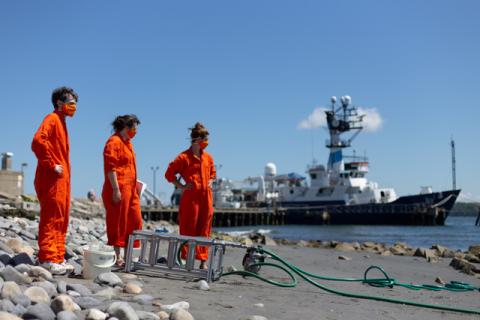
The University of Rhode Island (URI) has been a GCSE Member for 12 years. URI’s campus culture is one that embraces principles of sustainability in all of its practices. Integrating sustainability in curricula and research agendas, supporting community programs and incentives, hosting the largest solar array in the state on a capped waste disposal site, and designing buildings that reduce our impact on the environment are just a few examples of Sustainability@URI initiatives. URI also partners with the State of Rhode Island and southern New England regional communities on several large-scale initiatives that highlight the state's 400 miles of coast and its contribution to a mission of supporting ocean awareness, understanding, and sustainability.
In the past decade, URI and its regional community have played key roles in meaningfully implementing offshore wind energy solutions and combating plastic pollution as part of its broader research theme of understanding the emerging contaminants that enter our ocean. As the world launches the UN Decade of Ocean Science for Sustainable Development, URI aims to grow its local to global collaborations and collective impacts in these areas. With a surge in the use of plastics during the pandemic, URI and its partners, including GCSE, are eager to accelerate solutions to plastic pollution.
Across colleges, disciplines, and seas, URI provides global resources and leads several nationally funded projects to expand knowledge and solutions for challenges that threaten our oceans. One of the top oceanography schools in the world, URI’s Graduate School of Oceanography (GSO) hosts cutting-edge research facilities and ocean exploration technology on the URI Bay Campus including the Coastal Resources Center (CRC), the Inner Space Center for ocean exploration and education, Superfund Program STEEP (Sources, Transport, Exposure & Effects of PFAs), URI Diving Safety and Research Program, and the oceanographic research vessel, the R/V Endeavor, which is soon to be replaced with a state-of-the-art Regional Class Research Vessel that is currently under construction.
Ocean sustainability requires a multi-disciplinary approach, of course, and URI research teams across campus from the College of Environment and Life Sciences (CELS), College of Engineering, College of Arts and Sciences and College of Business are contributing to global ocean sustainability challenges via undergraduate education, graduate training, equitable community engagement, literature, effective and inclusive environmental communication, and globally recognized research.
Over the past decade URI’s faculty and students in CELS’ Department of Marine Affairs and GSO’s CRC have played pivotal roles in convening stakeholders to understand sustained ecological and social impacts of the historical siting and implementation of offshore wind energy just off the RI coastline. Through a five-year, $19 million statewide grant from the National Science Foundation’s Established Program to Stimulate Competitive Research program, URI connects engineers, scientists, designers, and communication experts from eight of the state’s higher education institutions to develop new approaches to assess, predict, and respond to effects of climate change on coastal systems. In the past two years, URI has been aligning its capabilities and capacity across the state to launch its Plastics: Land to Sea Initiative with the UN Decade of the Ocean. Top researchers will work closely with industry, policy experts, and local to global nonprofits to co-create research efforts that will inform society, guide policy, and accelerate long-term solutions to reduce ocean plastic pollution and ensure ocean sustainability. Across all of these approaches, URI’s goal is to prepare a future workforce trained in sustainability principles and practices.
Did You Know? URI’s Metcalf Institute has been advancing informed conversations about science and the environment since 1998. In 2018, the Institute launched the Inclusive SciComm Symposium to expand inclusive approaches to science communication, from formal classroom settings to museums to journalism. URI is a leader in this growing inclusive science communication movement to ensure that ocean science and policy draw on the insights of all people to provide equitable solutions.